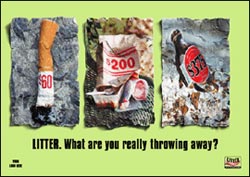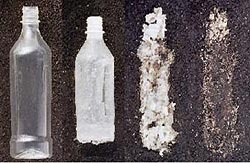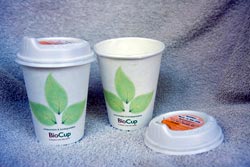Background Information
What can be done about marine debris?
Reducing marine debris will require cultural change through a combination of education, incentives, and regulation. Plastic bottle recycling is an excellent example – it has increased every year since 1990 to 2.2 trillion pounds in 2006.
Educational tools, such as the plastics identification code on bottles, provide important knowledge for the public and increased participation in recycling programs. Bottle deposits, an economic incentive, resulted in a 75% reduction in losses into the environment. Regulations, such as recent prohibitions on disposable drink bottles may further reduce the problem.

Our behaviour needs to change from the current throwaway culture to a more sustainable liefstyle.
| A plastic bag dropped in the street washes into stormwater drains which empty into the ocean. If you see
plastic in the street, don t let it become whale food - pick it up and put it in a bin! |
A government subsidised buy back scheme for old fishing nets could be helpful. As fishers are likely to be the ones who find old discarded nets, a buy back scheme would provide an incentive for the fishers to collect these nets.
A global approach is required to decrease the amount of debris entering the oceans. Fishing and shipping industries need to be particularly targeted, as these are mostly responsible for the problem.
Further research is also needed, for example, linking plastic in the environment to particular factories, stores, fishers or consumers is currently impossible.
|
|
The development and increased use of bioplastics is also important. Bioplastics are a form of plastics derived from renewable biomass sources, such as vegetable fats and oils, corn starch and pea starch rather than fossil-fuel plastics which are derived from petroleum.
Some, but not all, bioplastics are designed to biodegrade (be decomposed by bacteria or other living organisms). Use of these materials would reduce the amounts of plastic found in marine debris although there are other environmental problems associated with their use (e.g. fossil fuel use in growing the raw material and for their manufacture; competiton for land used to grow foods.) 

| Cigarette butts may seem small, but with an estimated 4.5 trillion butts (worldwide) littered every year, the
toxic chemicals add up. Make sure that cigarette butts go into the bin, not on the ground! |
Next: What is Australia doing about marine debris? ... |

